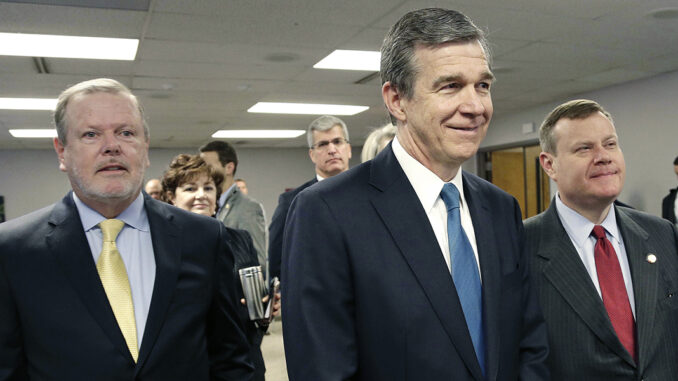
RALEIGH — Both chambers of the General Assembly have issued their budget adjustment proposals but disagree about the amount of spending and from what state reserves that spending will come.
The state currently has a $1 billion projected surplus over the next fiscal year.
The House unveiled its $31.7 billion budget adjustments proposal (House Bill 286) on June 17, which will head through committees and a floor vote this week to send it to the Senate. The House approved its version on June 19 following approval of nine out of 20 amendments offered.
“The House budget funds critical needs like child care, Opportunity Scholarships, and raises for our teachers and state employees,” said House Speaker Tim Moore in a statement following the June 19 vote. “I’m confident that this fiscally responsible budget strikes the right balance of conservative spending and prioritizing our needs in (President Joe) Biden’s economy. I am proud that this budget has received bipartisan support in our chamber.”
The same day the House approved its version, the Senate released its own $31.4 billion proposal through a preferred committee substitute for House Bill 317. It is just 46 pages compared to the 271-page House plan.
Senate Leader Phil Berger (R-Eden) previously said the Senate was not in agreement with drawing from state reserve funds and the $1.4 billion surplus for budget adjustments, expansions or “pork” projects.
“The Senate has tried to work something out with the House,” Berger said during a press availability on June 18 before the issuance of the Senate’s proposal. “We have agreed to dip into the reserves, but not nearly to the tune of the House, and we’ve only done that to try to get a deal, and they continue to want to spend way too much money.”
Berger added the Senate is planning to head home at the end of June “unless something changes drastically.”
A two-year budget was enacted last year, so the adjustments bill does not necessarily have to pass. If no agreement is reached, the previous budget’s spending will stand and stand-alone bills will be needed for certain programs like private school grants. If an agreement is reached, Democratic Gov. Roy Cooper is likely to veto it, though Republicans hold a supermajority to override.
The House proposal includes just over $488 million for the Opportunity Scholarship program (OSP) and disabilities grants, apparently from the Lottery Fund, General Fund and reserve funds. Around $250 million would fully fund the OSP to eliminate a 55,000-deep applicant backlog, and $200 million would fund grants for 2024-25.
The Senate agreed with the House on the OSP, including $463 million for those scholarships. The Senate previously passed a bill adding $463.5 million over two years, but it stalled in the House.
Cooper has opposed OSP and over the last year has called for a moratorium on its funding.
State employees would get an additional 1% raise on top of raises from last year’s budget. Correctional officers would receive a 9% increase, and there’s a one-time 2% cost-of-living bonus in the House plan. The Senate’s proposal offers no pay increases beyond the previously enacted budget.
The House proposal increases teacher pay by 4.4% this year. Beginning teachers would get a 12.8% raise, while veteran teachers with 15 or more years would see 2.6%. Starting salaries rise to $44,000. Master’s and advanced degree pay would be restored.
One-time funding of $35 million would go to school safety equipment, training and crisis mitigation. Recurring funds totaling $33 million aim to add more school resource officers for elementary and middle schools.
With federal child care stabilization grants expiring, the House included $135 million for child care centers. The Senate’s plan also overlaps on the issue, with $136.5 million.
Another area where both the House and Senate plans agree is $150 million for road construction-related issues near the site of the new Toyota factory in Randolph County.
Medicaid is also in both spending plans. Under the House, the Medicaid Contingency Reserve gets a $350 million boost to address a funding shortfall. The same amount is found in the Senate plan for the Contingency Reserve.
After years of calling Medicaid expansion a “nonstarter” and warnings that 39 other states have failed to keep expansion costs under control, lawmakers pushed through a Medicaid expansion bill that would add an estimated 600,000 North Carolinians to the federal program.
Medicaid Expansion has been one of Cooper’s top priorities since first taking office in January 2017.


